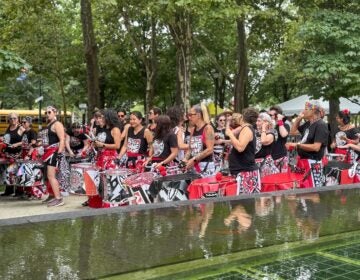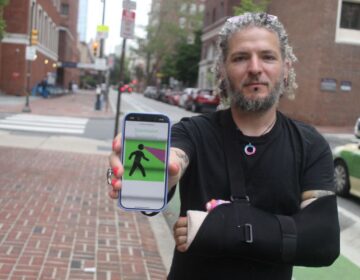7 things to know about the noisy Chelten Plaza saga
The Chelten Plaza battle will finally make its way into a city Zoning Board of Adjustment hearing on Wednesday.
The developers who want to turn the former site of a Fresh Grocer into a Save-A-Lot and Dollar Tree will be there. The protestors who say they deserve better-quality stores to revitalize their neighborhood will be on-hand, as well. And, of course, attorneys for both sides will do most of the talking.
It’s an ongoing, complex matter, as many things zoning are, and it will be the focus of a noon zoning board meeting. Protestors plan to be there in force, taking buses to Center City from Chelten Plaza.
Why so much fuss over a grocery store? Here are seven key points that the casual observer needs to know to understand the issue of the year in Germantown:
1) This hearing isn’t about Save-A-Lot: Whether developer Pat Burns – who operated the late Fresh Grocer – can build a Save-A-Lot grocery store and a handful of other retail shops at Chelten Plaza isn’t the issue. The appeal is all about the Dollar Tree. Specifically, why wasn’t this storeincluded on the application the developer submitted to L&I? New variety stores are zoning no-nos there now.
2) The opposition has been vocal and persistent: For months, protesters from various civic groups have brought themselves, petitions, music, yellow T-shirts and a mission to solidify neighborhood opposition to the project.
3) They think the developer thinks poorly of the neighborhood: Protestors claim Burns thinks Germantown is “a ghetto” that can’t support the kind of high-end supermarket they would prefer. They say he’s wrong, and that another Save-A-Lot will attract “a bad element.”
4) Civic-group divisions have been exposed: Germantown Community Connection has expressed concerns about the zoning process and the overall plan for Chelten Plaza, but haven’t denounced it. This infuriates other groups who think GCC is enabling Burns to claim wider community support than he really has.
5) Community support is key to public funding: Burns has received $4 million in public money for the project, as well as a previous $1 million he received for building the Fresh Grocer. This has Germantown residents insisting they deserve a greater say in the kind of projects a developer brings to their neighborhood using their tax dollars.
6) A “community benefits agreement” is one requirement for that public money: GCC is working with Burns’s Pulaski Partners on a community benefit agreement. It is expected to include dollars for the damages caused by the development. GCC President Betty Turner said those dollars won’t go to her group: “We are a non-profit, we don’t want for-profit dollars.” Other residents critical of GCC say it is not getting enough out of those negotiations.
7) What is Germantown, anyway?: The Chelten Plaza drama has sparked a very public conversation about Germantown’s identity. Is it a Save-A-Lot or Whole Foods neighborhood? This question generates a lot of emotion. Protesters talk about wanting a better quality, full-service grocery store in the neighborhood (Trader Joe’s comes up a lot), but many lower-income, largely African-Americans residents continue shopping at Save-A-Lot.
WHYY is your source for fact-based, in-depth journalism and information. As a nonprofit organization, we rely on financial support from readers like you. Please give today.






